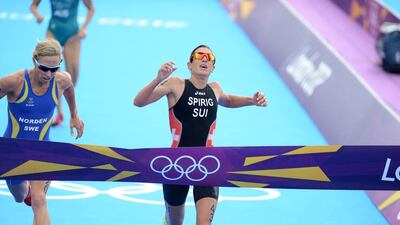ABU DHABI // Imagine completing, in turn, a 1.5km swim, a 43km bike ride and a 10km run. Imagine storming them all.
Then imagine that at the end of it all, 12 seconds short of two hours of the most demanding sporting pursuit there is, a freeze-frame photograph needs to be examined to show conclusively who has won.
Really?
This was the situation confronting Nicola Spirig, the Swiss triathlete, for a few minutes at the 2012 London Games.
Somehow, over such distance, nothing could separate Spirig and Sweden’s Lisa Norden.
Eventually the photograph confirmed Spirig had won it, by the width of her vest.
Read also:
Mario Mola happy to be back to defend ITU World Triathlon Abu Dhabi title
Javier Gomez and Mario Mola, world triathlon’s No 1 and 2, set for Abu Dhabi showdown
2016 Abu Dhabi Triathlon Elite Course – map
2016 Abu Dhabi Triathlon: Everything you need to know
“I was definitely relieved that the race was over and that I had a medal for sure,” Spirig told The National, ahead of the International Triathlon Union (ITU) World Triathlon Abu Dhabi this weekend.
“But there is a huge difference between being the Olympic champion and getting second. As an athlete you always have a feeling if you got through the finish line first or not, and I thought I had won, but of course at Olympics you don’t rely on your feelings.”
In those moments between the finish and the confirmation, she chatted with Norden; it may have made for an awkward conversation, but did not. Norden thought Spirig had won and was happy with silver.
“I first had to know for sure if it was gold or silver before I could be happy for either medal, and the minutes until the decision had been made were very long.”
The finish was one of the athletics highlights from the Games, though few could have imagined that Spirig and Norden would not face each other again on the circuit until this weekend.
Spirig took some time off after London to become a mother and then dabbled in other disciplines, such as marathons and Ironman races. They were due to line up against each other in Stockholm last year, but an injury to Norden derailed that opportunity.
Abu Dhabi, which Spirig is visiting for the first time, is a major stop in a major year. She has not altered her training specifically for the conditions she might encounter this weekend and, to many, it may be better for watching a triathlon at the Corniche rather than taking part in one.
“I didn’t prepare for it with any special training, but I was in Gran Canaria for two training camps,” she said. “So at least I am not coming out of the Swiss winter with snow and sub-zero temperatures.”
In July comes the major purpose of her year. She will be defending her title at the Rio Olympics though whatever happens she will be making some history, as only the fourth triathlete to take part in four Olympic Games.
That kind of endurance, in a sport of ultimate endurance, is worth highlighting. She has been doing triathlons since she was 10, primarily because her parents were sports teachers and her father and uncle both competed in triathlons regularly.
“I was also always intrigued by the question of how fast I could get and where my limits are,” she said. “Therefore I am always motivated to push myself, to set myself challenges and to find out how far I can get.”
Twelve years ago, when she took part in her first Olympics, in Athens, she was just happy to be there. At Beijing, four years later, she finally emerged as a contender, finishing sixth ultimately.
By the time London came around, she was one of the favourites, and expecting at least a medal. This time again will be different and not only because she arrives as the target for everyone else.
“Now, in Rio, I will be the defending champion, completely different circumstances again,” she said. “It also requires a different approach to the race. This time as a mother and Olympic champion with obligations I won’t be able to prepare the same way as I did for London.”
She has had to work around these obligations. Her daily training routine, in any case, is never the same as the previous day but her son has become an important part of them.
“I normally train three times a day, but the sessions vary a lot. There can be a swim, a bike and a run, but there can also be three runs, or two bikes and a swim, or a long bike with a run off the bike and a swim after that.
“I like to spend as much time as possible with my son in between the sessions, that is basically my recovery. Of course I also need to fit in the obligations as an Olympic champion and events from sponsors and the media.
“My life is very full but luckily I have a lot of support from my team and especially from my husband.”
osamiuddin@thenational.ae

